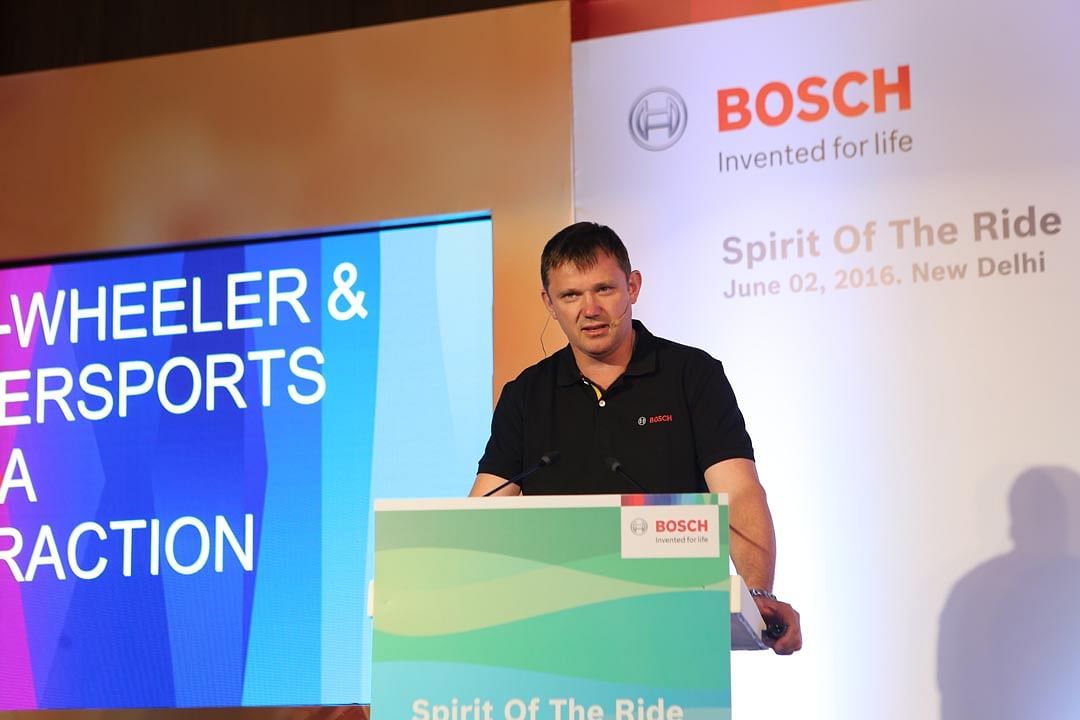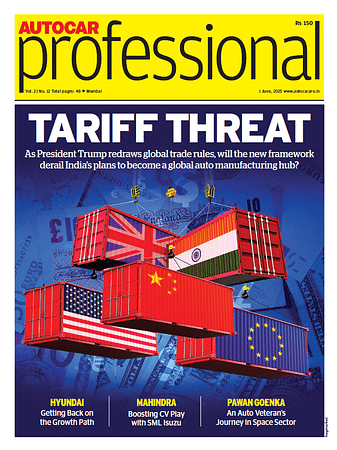Bosch targets Indian two-wheeler market for ABS, EMS and connectivity
While ABS offers safety even for bikes with front-only disc brakes, new EMS can enable advantages of migration to fuel injection at an affordable price point. Connected solutions for motorcycles are also being developed.
Global automotive components and services supplier Bosch is betting big on catering to the growing market for anti-lock braking system (ABS) market in India, particular for two-wheelers.
Driving this focus is the recently announced fitment of ABS on two-wheelers above 125cc as a mandatory requirement beginning April 2018. For Bosch India, this is a reinforcement of the life-saving potential of safety systems like ABS.

Commenting on the scope of the two-wheeler business in New Delhi today, Geoff Liersch, Head of Bosch Business Unit Two-Wheeler & Powersports, said, “India is a key market for two-wheelers. Developments taking place here have the potential to influence other emerging markets, such as Indonesia and Thailand, where small two-wheelers also count as important means of transportation. Additionally, India also presents us with an opportunity to develop innovative solutions tailored to the need of emerging markets.”
Given the significance of the two-wheeler industry in the Indian automotive context, Bosch India aims to contribute more than one-third of Bosch’s global Two-Wheeler & Powersports business. “It is a target we aim to realise by the end of the decade,” said Sandeep N, regional business head, Two-Wheeler & Powersports business.
An estimation from the company’s accident research study suggests that every third accident involving a two-wheeler in India can be avoided through the implementation of motorcycle ABS. Going beyond, the equipment can also reduce the collision speed of every fifth accident thus helping reduce the severity of injuries sustained.
EMS for improving fuel efficiency in two-wheelers
Bosch says the engine management system (EMS) has been tailored to the requirements of emerging markets, especially to Asian countries like India.
The EMS includes a control unit, a fuel injector and software that makes it unnecessary to use individual sensors in the vehicle. By implementing new manufacturing processes and intelligent software algorithms, Bosch has been successful in keeping the development cost effective.
The company says its EMS can help India’s wide-ranging two-wheeler segment make the transition to the next level of emission regulations as they become applicable. Compared with the traditional carburettor offering, and depending on the situation, the electronically controlled fuel-injection system can reduce fuel consumption by up to 16 percent.
Apart from paying significantly less for fuel when compared to a conventional carbureted vehicle, Indian riders can benefit from better cold-start performance as well as a more spontaneous engine response. An entire platform of two-wheelers in India has been built around it, which enables vehicles in the country to cost less but emit cleaner air.
Bosch says its Two-Wheeler & Powersports team in India has played a significant role in the development of the EMS. “We had to create a simple system capable of withstanding the two-wheeler environment at a price point that is both affordable and enables mass migration,” commented Sandeep N on the development of the EMS.
Connected motorcycles also a safer riding option
Connected vehicles are the norm of the future and two-wheelers will be no different. The availability of digital intelligence in a two-wheeler will pave the way for multiple functionalities that can be realised with an app-based approach.
Digital connectivity will ensure that two-wheelers are not just safe and clean but fun and connected as well. Bosch already has various motorcycle connectivity solutions in its portfolio. The integrated connectivity cluster (ICC) is a rider information system that can connect motorcycles, smartphones and multiple apps. Through this the two-wheeler is enabled with rich functionalities, such as navigation and traffic guidance. Furthermore, it also offers lifesaving functions such as eCall – an automatic emergency call service in case of an accident. “It won’t be long before we start to see increased demand for these connected functions in India. Bosch is getting ready for it,” said Liersch.
Recommended: Booming motorcycle tech business sees Bosch target sales of a billion euros by 2020
RELATED ARTICLES
Continental exits TBR market in India, shifts focus to car and SUV radials
German tyre manufacturer aims to tap the double-digit market growth opportunity for big SUV and luxury car tyres which w...
New ZF SELECT e-drive platform gives EV makers a choice in 100 to 300 kW range
Modular e-drive platform optimally matches 800-volt overall system and components such as the electric motor and power e...
Daimler India CV and BharatBenz deliver 200,000th truck
Daimler India Commercial Vehicles' portfolio includes truck models ranging from 10 to 55 tonnes for a wide variety of ap...





 By Autocar Professional Bureau
By Autocar Professional Bureau
 02 Jun 2016
02 Jun 2016
 22545 Views
22545 Views









